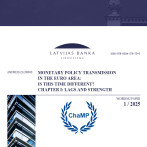The role of more liquid instruments increasing in money supply
The situation in the financial market and the structure of money supply in November was impacted by the suspension of "Latvijas Krājbanka" operations. The demand for cash currency went up rapidly, whereas in the total volume of attracted deposits the balance of term deposits shrank but the balance of sight deposits grew. The total money supply grew slightly, primarily as a result of growing cash currency and enterprise deposits, whereas the bank-attracted household deposits diminished. The total of loans dropped in November, with the lending both to businesses and households dropping slightly, yet the total annual bank loan portfolio shrinkage rate was the lowest in the last 15 months (-7.6%).
The loans granted in euro kept dropping mostly as a result of housing loans continuing to be repaid whereas lats loans grew 5.3%, and the percentage of lats loans in total loans reached 10.6%. Lending in lats grew both in the business and household sector where the balance of housing loans granted in lats continued to grow.
Money indicator M3, which characterizes both the amount of cash and non-cash currency in the economy grew in November by 0.8%, with the annual M3 increase at 2.3%. The balance of domestic deposits attracted by commercial banks dropped in November by 3.0%, with the drop mostly determined by the still uncompensated part of deposits of the Deposit Guarantee Fund. Since the deposits of the suspended bank were mostly concentrated in the household sector, the drop affected total household deposits while business deposits grew.
Lending activity is not likely to grow in the near future, for the turbulence in the domestic financial sector, the tense economic situation in the euro area and the signs of political instability in Russia will reduce both the desire of businessmen involved in the above markets to assume new liabilities and the desire of banks to raise the level of credit risk. On the one hand, the approval of next year's budget and the agreement reached with the international lenders on concluding the international loan programme as well as hope that the euro area member states will make decisions that will ensure financial sustainability and take effective measures to contain the crisis could sound a more positive note. Yet it must be taken into account that the substantial deterioration of the situation in external markets means continued great risks and budget consolidation may have to be continued as early as next spring. In the area of accruals, the events of recent weeks preclude any long-term predictions. It is only clear that December will conclude with a record high amount of cash currency in circulation and also within the area of deposits, mostly sight deposits, which are the most liquid, will be chosen.
Textual error
«… …»






